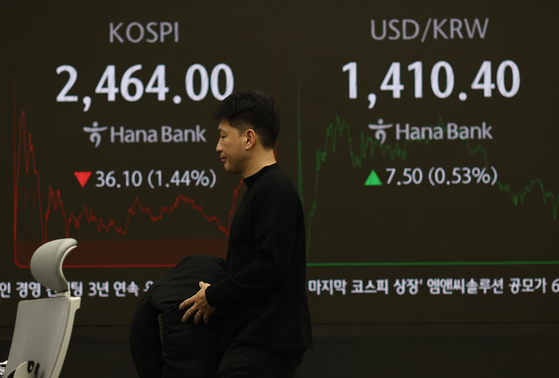Korean shares tumbled on a selling spree by foreign investors and the local currency fell to a two-year low on Wednesday, following overnight turmoil triggered by President Yoon Suk Yeol’s emergency martial law declaration.
This additional layer of major uncertainty is further fueling skepticism over the country’s growth outlook. While the short-term shock to the financial and foreign exchange markets appears to have relatively subsided, experts suggest that the ongoing political chaos, which is likely to only worsen for a while, may further hinder the already-weak recovery in domestic demand and investment sentiment.
The Kospi lost 36.1 points, or 1.44 percent, from the previous session to close at 2,464 on Wednesday, after falling as low as 2,442.46 about 40 minutes after the market opening.
The Korea Exchange, the country’s bourse operator, initially considered suspending operations on Wednesday after the president declared emergency martial law at around 10:30 p.m. on Tuesday, but decided to open the exchange as usual on a decision from financial authorities early that morning.

Trading volume was heavy at 13.07 trillion won ($9.24 billion) on Kospi, with foreigners offloading shares worth a net of 406.5 billion won, reversing the previous session’s strong buying of 564.5 billion won. Institutions picked up shares worth 16.73 billion won, and retail investors bought 337.9 billion won.
Losers far outnumbered gainers by 737 to 176, with Samsung Electronics shedding 0.93 percent to 53,100 won, and Hyundai Motor declining 2.56 percent to 209,000 won. SK hynix, however, rose 1.88 percent to 168,000 won.
The won-dollar exchange rate rose 7.2 won to close at 1,410.1 against the greenback as of 3:30 p.m. This marked the weakest closing rate for the day-trading session since 1,419.2 won was logged on Nov. 4, 2022.

The depreciation moderated compared to a steep plunge that followed Yoon’s announcement overnight. During the previous session, the won-dollar rate peaked at 1,442 mid-trading, marking a 39.1 won jump from its closing price at 3:30 p.m., before it gradually stabilized to close at 1,425 at 2 a.m. Wednesday.
While the volatility spike overnight has calmed to a degree, some analysts pointed out that the incident’s lingering impact may further accelerate the foreign capital outflow from the Korean market in the near term.
“Damage that this martial law incident caused to the trustworthiness of the Korean economy and financial market could have a huge negative impact on the won’s value and the economy,” said Park Sang-hyun, chief economist at iM Investment & Securities.
“Foreign investors have already been skeptical of [the prospect of] the Korean market due to policy uncertainties related to the incoming Donald Trump administration and China-related risks — and this new political uncertainty may further undermine their confidence in the domestic market,” Park suggested.
“Though the martial law [declaration] seems to have ended as an overnight occurrence, there is remaining pressure nudging foreign investors to pull out of the market to avoid political uncertainties in the short term,” Shinhan Investment & Securities also noted.
As the Korean economy has already been facing slowing growth momentum for the next year amid persistent internal and external uncertainties, the latest development may further hinder the weak recovery in domestic demand, said Joo Won, head of economic research at Hyundai Research Institute.
“This incident may weaken consumption and investment sentiment, not because of the declaration itself, but due to the political conflicts that will inevitably ensue,” said Joo.
“The political tensions and conflicts will only grow worse from now on; this [uncertainty] can negatively impact companies’ investment sentiment, as well as household consumption.”
The Organisation for Economic Cooperation and Development, or OECD, lowered its growth forecast for the Korean economy next year to 2.1 percent, down 0.1 percentage point from its previous projection, according to the Ministry of Economy and Finance on Wednesday.
The International Monetary Fund projected the Korean economy to grow 2 percent next year, down from the previously expected 2.2 percent. The country’s central bank also adjusted its growth projection from the previous 2.1 percent to 1.9 percent for 2025.
BY SHIN HA-NEE [shin.hanee@joongang.co.kr]




